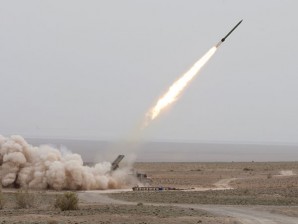
A missile is launched during an Iranian army exercise in central Iran, Thursday, March 14, 2013. Iranian media say the military has test-fired several short-range missiles, including the type Palestinian militant Hamas group used to attack Tel Aviv last November. Thursday’s report by the semi-official Fars news agency says the missiles were tested during an army exercise in central Iran. It says the missiles fired were Nazeat-10 and Fajr-5. Iran regularly holds maneuver to test and promote its military power.(AP Photo/Hadi Yazdani)
VIENNA — While international diplomacy has focused on trying to prevent Iran from using enriched uranium to produce nuclear arms, concern is growing about another rapidly advancing project that could supply plutonium for a nuclear weapon.
Tehran hopes to have a plutonium-producing reactor up and running next year, part of a nuclear program that the Iranians insist is designed to produce electricity and material for medical and scientific research — not for bombs.
Both plutonium and enriched uranium can be used to produce a nuclear explosion. International concern has so far focused more intensely on Iran’s uranium enrichment path.
That’s because Tehran won’t be able to produce plutonium until next year at the earliest and doesn’t have the means to convert it into bomb material. It is now enriching uranium to a level only a step away from weapons-grade.
Iran denies any interest in atomic arms, and says neither the uranium enrichment nor the plutonium reactor contravenes the Nuclear Nonproliferation Treaty. U.N. Security Council resolutions, however, demand it suspend both programs because the U.N.’s nuclear watchdog organization says Iran isn’t fully honoring commitments meant to allow the agency to monitor its nuclear sites.
The United States and its allies worry about the plutonium reactor at Arak, southwest of Tehran. U.S. envoy Joseph Macmanus told a recent meeting of the International Atomic Energy Agency — the U.N. nuclear watchdog — that the reactor is “of increasing concern” as its startup date approaches. Israel, which has taken a lead in criticizing Iran’s nuclear program, is even more concerned.
During a visit by President Barack Obama this week, Israeli Prime Minister Benjamin Netanyahu was expected to push for a U.S. commitment not to let Iran develop nuclear arms. Obama would likely urge Netanyahu — who has warned of possible Israeli military strikes on Iran over the issue — to give negotiations and sanctions more time.
Netanyahu has said Iran will by mid-2013 have amassed enough higher-enriched uranium to relatively quickly make the 25 kilograms (55 pounds) of weapons-grade material needed for one nuclear bomb. The plutonium reactor would take longer to finish. While Iran and Israel say it will be running by next year, Western intelligence services say it might take a year or two beyond that. In addition, Iran would have to build a reprocessing plant to turn plutonium waste from the reactor into warhead material.
Dore Gold, a former Israeli ambassador to the United Nations and an informal adviser to Netanyahu, describes uranium enrichment as “the immediate burning issue,” but said the plutonium reactor is “not that far behind.”
Iran says it has no plans to build a reprocessing plant. Israel doesn’t believe that.
It bombed Iraq’s Osirak reactor in 1982 and a 2007 air strike attributed to Israel flattened a Syrian site the IAEA subsequently identified as “very likely” a nearly built reactor. Israel said both were meant to produce plutonium, and the IAEA shared that assessment for the Syrian target. Neither country had known reprocessing facilities.
With Iran much more able to retaliate than those nations and the U.S. demanding restraint, Israeli officials are split on whether to risk such an attack. If they decide to attack, the strike would likely come sooner rather than later, before the reactor starts producing plutonium. That was the case in Iraq and Syria.
Hitting “an operating reactor would present enormous complications because of the radiation that would be spread,” said former senior U.S. State Department official Mark Fitzpatrick of the International Institute for Strategic Studies.